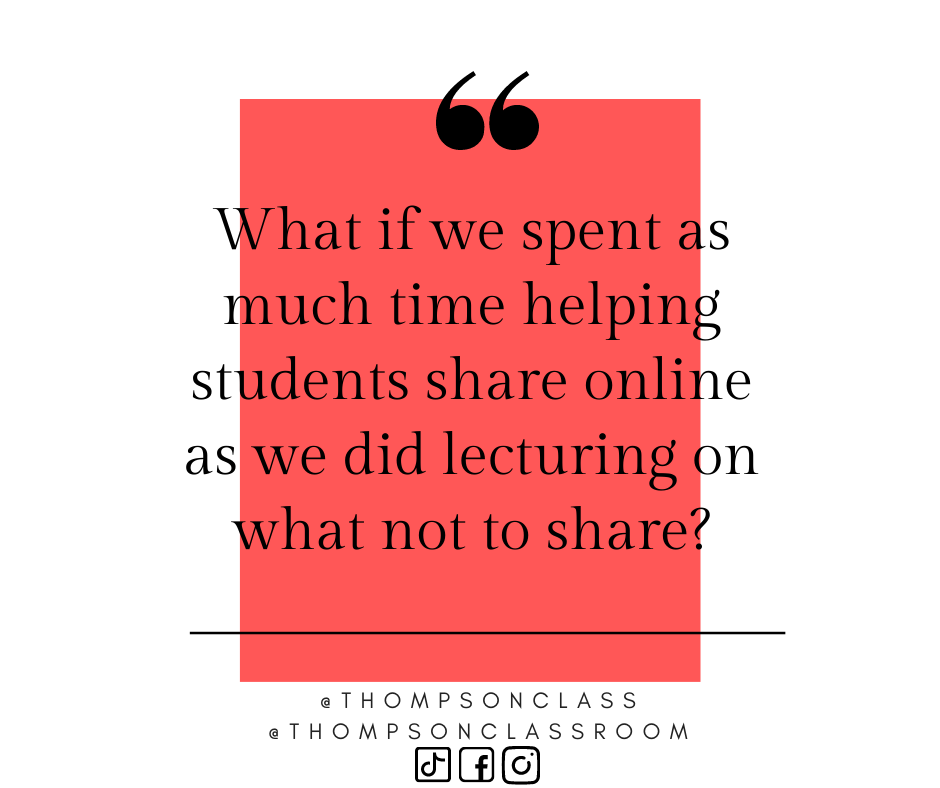What Should Students Share Online?
If you are reading this blog then you already know my stance when it comes to sharing online. I strongly believe that we have a large demographic of consumers and that our students need to be provided with opportunities to share online and develop a positive digital footprint. Unfortunately, I often hear of schools who feature guest speakers discussing the “dangers” of social media and threatening about how what students share online will haunt them in their future endeavors.

While I do believe that these types of conversations, when framed productively, are important I don’t believe they should happen in isolation. I’ve seen too many examples where students hear these types of messages but then:
- are not provided with models on what age-appropriate sharing looks like
- are not able to practice these types of digital literacy and citizenship skills in a supervised space
- are unable to ask trusted adults for assistance when they have questions or are in trouble
- I find this especially evident in schools that provide messaging that students can come to them with concerns but then the school has blocked social media sites so the student is unable to show their concern and the adults cannot help them access settings to change their privacy, block/report, etc
I believe that schools should provide opportunities for students to:
- share their content with an authentic audience
- connect their learning with experts in the field
- get feedback from those outside of the teacher
- practice utilizing platforms relevant to their industry
- develop a positive digital footprint
Online Sharing Considerations
When publishing student work online the following factors need to be taken into consideration:
- Applicable Policies/Procedures
- Are there are policies or procedures that need to be taken into account before starting an online publishing project with students?
- These may be hosted at the school, division, or provincial level(s)
- Examples may include:
- Student media release permissions
- Intellectual copyright
- Social media guidelines
- Acceptable ICT use policy
- Data storage conditions
- Platform Terms of Service
- Read and think critically about the Terms of Service (user agreement) of the platform(s) you are thinking of using. Some things to look for include:
- Do users need to be a specific age to use the service (ex: most social media platforms require users to be 13+)
- Who owns the data that is uploaded to the platform (student intellectual property)
- Where is the data stored? (in your country?)
- Who is the data shared with?
- Is there anything that would not align with components of factor 1?
- Read and think critically about the Terms of Service (user agreement) of the platform(s) you are thinking of using. Some things to look for include:
- Platform Choice
- Is this platform internal or external?
- Internal examples: school or divisional LMS (Teams, Seesaw, Class Dojo), MS Stream, unlisted blogs, not “Google-searchable”
- does not necessarily contribute to a public digital footprint
- may not be able to reach an authentic audience or experts
- usually lost to the student if they move or graduate
- less opportunity to practice authentic digital literacy/citizenship skills
- more easily managed by educators
- External: public blogs, listed YouTube channel, public social media accounts
- builds a public digital footprint
- increased opportunity to connect with an authentic audience
- accessible to students if they move or graduate
- increased opportunity to practice authentic digital literacy/citizenship skills
- requires more management and support
- Internal examples: school or divisional LMS (Teams, Seesaw, Class Dojo), MS Stream, unlisted blogs, not “Google-searchable”
- Is the platform(s) chosen by students based on interest or decided by the teacher?
- Are there platforms that suit a specific industry that should be utilized?
- Is this platform internal or external?
For all projects, I recommend sharing your vision with your administrator and any applicable coordinators/coaches who can assist you in the above factors.
Online Sharing Options
How your students share online will depend on the factors listed above but also their age, developmental stage, and their reason for sharing. Some options include:
Podcasts
Blogs
YouTube
Social Media Platforms
Website Development